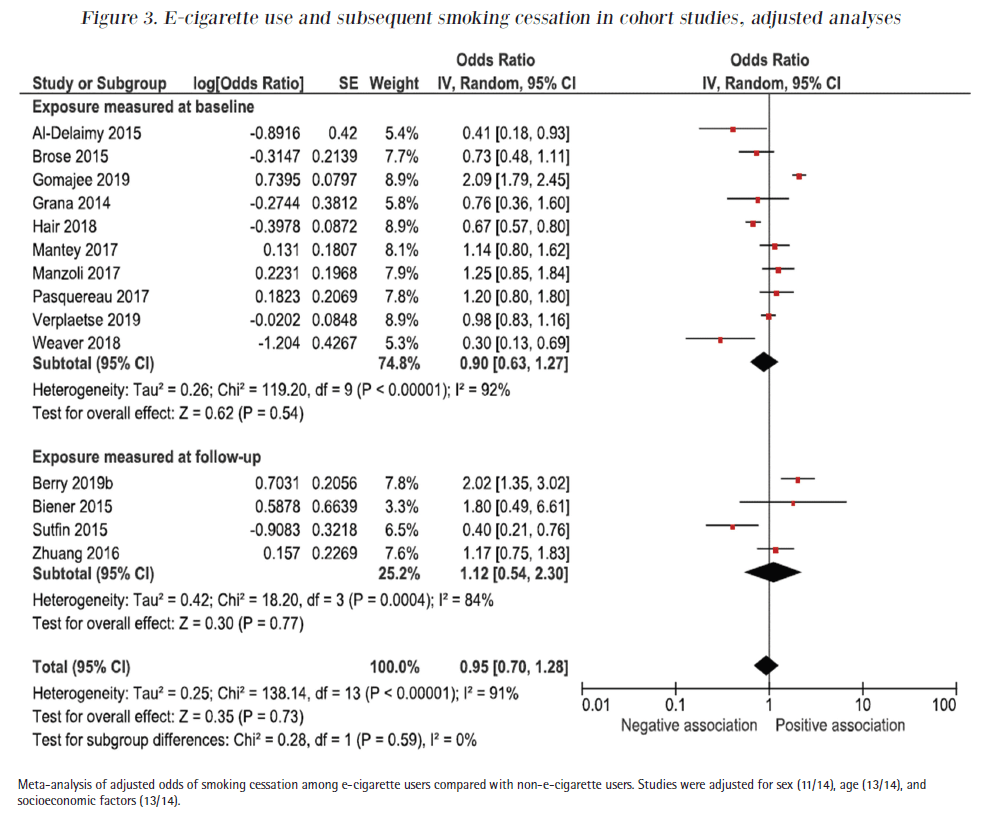Linnea Hedman and colleagues in Sweden just published a new meta-analysis of the relationship between e-cigarette use and smoking cessation, Electronic cigarette use and smoking cessation in cohort studies and randomized trials: A systematic review and meta-analysis. Like our earlier meta-analysis, did separate analyses of population-based observational studies and randomized trials of e-cigarettes provided as part of clinically supervised smoking cessation efforts. Like our analysis, they concluded that as used in the population e-cigarettes were not associated with increased smoking cessation.
in contrast, delivered as supervised medicines (often combined with counseling) they were associated with increased cessation.
These consistent findings are not surprising because Hedman et al assessed the literature as of November 2019, which is about the same as our assessment, which was the literature as of January 2020. Their analysis, however, was a bit different. Whereas we considered all available populations studies, including both cohort (longitudinal) and cross-sectional studies, they limited their analysis to the methodologically stronger cohort studies. (We also analyzed the cohort and cross sectional studies separately; they were not significantly different.) Despite this more stringent selection criteria, they reached the same conclusion we did: e-cigarette use was not associated with increased cessation in the population.
Another new and unique contribution in the Hedman paper is that they examined whether it mattered whether e-cigarette use was assessed at the beginning or end of the study. It did not matter. They also showed that whether one used unadjusted odds ratios or odds ratios adjusted for demographic and other factors (figure from their paper above) did not impact the conclusions. These sensitivity analyses strengthen the confidence we can have in their finding that e-cigarettes as consumer products do not help smokers quit cigarettes.
This paper is particularly timely because the FDA says it will prioritize cohort population studies when assessing the effects of e-cigarettes on smoking behavior. (They also said they would prioritize randomized trials, but those are appropriate for assessing medicines, not consumer products that are used without medical supervision.) Hedman and colleagues analyzed cohort studies.
The FDA, our friends in England, and other e-cig enthusiasts around the world need to accept the reality that e-cigarettes as consumer product are not facilitating smoking cessation and start acting accordingly.
Here is the abstract:
Introduction: The aim of this systematic review and meta-analysis was to assess the association between e-cigarette use and subsequent smoking cessation in cohort studies and randomized controlled trials (RCT).
Methods: A systematic literature search was finalized 11 November 2019 using EMBASE, Cochrane Library, Scopus, PubMed Health, NICE evidence search, PROSPERO, CRD, PsycInfo, and PubMed including Medline. Inclusion criteria were: reporting empirical results; longitudinal observational design with a minimum of 3 months of follow-up; including general population samples; and allowing for comparison between users and non-users of e-cigarettes. Studies rated as having high risk of bias were excluded. The procedures described by PRISMA were followed, and the quality of evidence was rated using GRADE.
Results: Twenty-eight longitudinal, peer-reviewed publications from 26 cohort studies, and eight publications from seven RCTs assessing the association between e-cigarette use and smoking cessation were included in this review. A random-effects meta-analysis based on 39147 participants in cohort studies showed a pooled unadjusted odds ratio (OR) for smoking cessation among baseline e-cigarette users compared with baseline non-users of 0.97 (95% CI: 0.67-1.40), while the adjusted OR was 0.90 (95% CI: 0.63-1.27). The pooled odds ratio for smoking cessation in RCTs was 1.78 (95% CI: 1.41-2.25). The evidence for cohort studies was graded as very low and for RCTs as low.
Conclusions: We did not find quality evidence for an association between e-cigarette use and smoking cessation. Although RCTs tended to support a more positive association between e-cigarette use and smoking cessation than the cohort studies, the grading of evidence was consistently low.
The full citation is: Hedman L, Galanti MR, Ryk L, Gilljam H, Adermark L. Electronic cigarette use and smoking cessation in cohort studies and randomized trials: A systematic review and meta-analysis. Tob Prev Cessat. 2021 Oct 13;7:62. doi: 10.18332/tpc/142320. PMID: 34712864; PMCID: PMC8508281. It is available for free here.
